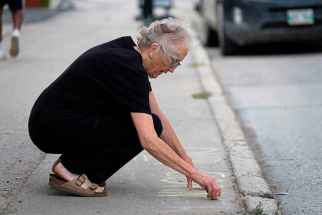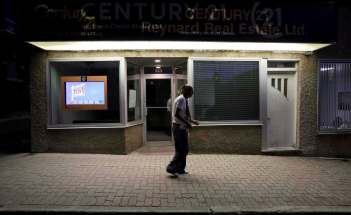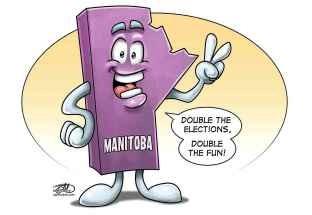Joe’s journey Former No. 1 NHL draft pick Joe Murphy lives on the streets of Kenora; his struggles have put the spotlight on homelessness and crystal meth in the northwestern Ontario city
Read this article for free:
or
Already have an account? Log in here »
To continue reading, please subscribe:
Monthly Digital Subscription
$0 for the first 4 weeks*
- Enjoy unlimited reading on winnipegfreepress.com
- Read the E-Edition, our digital replica newspaper
- Access News Break, our award-winning app
- Play interactive puzzles
*No charge for 4 weeks then price increases to the regular rate of $19.00 plus GST every four weeks. Offer available to new and qualified returning subscribers only. Cancel any time.
Monthly Digital Subscription
$4.75/week*
- Enjoy unlimited reading on winnipegfreepress.com
- Read the E-Edition, our digital replica newspaper
- Access News Break, our award-winning app
- Play interactive puzzles
*Billed as $19 plus GST every four weeks. Cancel any time.
To continue reading, please subscribe:
Add Free Press access to your Brandon Sun subscription for only an additional
$1 for the first 4 weeks*
*Your next subscription payment will increase by $1.00 and you will be charged $16.99 plus GST for four weeks. After four weeks, your payment will increase to $23.99 plus GST every four weeks.
Read unlimited articles for free today:
or
Already have an account? Log in here »
Hey there, time traveller!
This article was published 14/08/2019 (2311 days ago), so information in it may no longer be current.
KENORA, Ont. — Joe Murphy wanders outside in a steady rain, eventually finding a place to sleep for the night in the doorway of a small restaurant.
His black tennis shoes are soaking wet and the bottom of his feet have pruned and turned bright white.
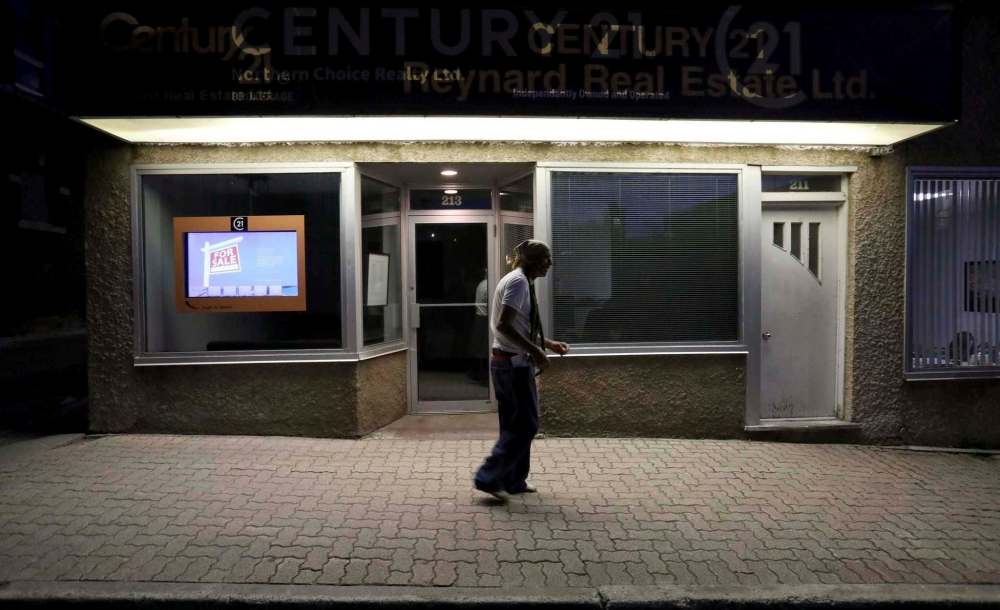
Murphy, selected by the Detroit Red Wings with the No. 1 overall pick in 1986, earned more than US$13 million while playing 15 seasons in the NHL, but he is homeless again, just like last year. He doesn’t own socks, so he rips a T-shirt into strips and wraps them around his ankles.
“These are my socks right now,” Murphy says. “My feet have gone all white. Freakin’ nasty. I don’t need to remove my toes, I don’t think. But it’s going to be stinging and nasty, right?”
Dozens of people have tried to get Murphy off the streets of this small tourist town the past two years, including the NHL Alumni Association, members of the local police department, former teammates, his lawyer and an entire team of mental health experts and social workers. He refuses almost all of it.
Murphy stayed in an extended-stay motel paid by the NHL Alumni Association for several months last winter but moved out, although he can’t offer a coherent reason. He spent time at a hospital in Thunder Bay, for a court-ordered mental-health evaluation. But he’s back in Kenora. He slept in a tent but he says it ripped. And now, he is back sleeping on benches, in doorways, inside a tunnel and under a gas station sign at the edge of this small city of about 15,000.
A year ago, Detroit Free Press photographer Eric Seals and I spent several days with Murphy in Kenora working on a story about Murphy. The whole time, I was consumed with one question: How does one of the NHL’s No. 1 overall picks end up homeless?
Earlier this summer, I heard Murphy was back on the streets, so we returned to Kenora. After searching for him for 18 hours in a steady rain, we found him walking down a road near a Walmart. But this time, a different question keeps nagging at me: Why does he stay on the streets, refusing assistance?
“I do like being alone,” Murphy says. “I have a lot of energy. People are always coming after me to talk. Not physically. I can feel the spiritual stuff. I just like being alone in a room. When I’m out talking to people, it bothers me sometimes.”
Talking to Murphy is fascinating but also confusing. Nothing moves in a straight line. The subject changes suddenly. Thoughts don’t always connect. Follow-up questions are futile because he jumps quickly to the next subject.
Murphy is obsessed with angels and archangels. He believes spirits control people by getting them to say things and do things like “marionettes.” As if they’re puppets.
“Did you hear that?” he asks, looking at me with a stunned expression, while sitting in a booth at an A&W.
“What?” I reply.
“Come on, you know what happened,” he says. “There was a spirit above your head and you told it to leave and vvvrrpp! Gone.”
He will say this to me several times over a couple of days in Kenora, mentioning the spirits he hears above my head.
“You didn’t hear that? You have a power,” he says, as his eyes widen and he looks at me in wonderment. “You just did something. I was listening to you. I don’t know if you heard it. You just took somebody out. I don’t know who it was. It’s none of my business. But they are gone.”
Murphy talks openly about having mental health issues. Murphy has struggled with depression, difficulty thinking, short-term memory loss, emotional instability and suicidal thoughts — all of which are symptoms associated with chronic traumatic encephalopathy (CTE), the degenerative disease believed to be caused by repeated blows to the head.
Murphy suffered several concussions playing professional hockey, although it is unclear what impact that has on his current condition.
Murphy was part of the failed attempt to attain class-action status in a concussion lawsuit against the NHL. The lawsuit argued Murphy “suffered multiple head traumas during his NHL career that were improperly diagnosed and treated by the NHL. Mr. Murphy never was warned by the NHL of the negative health effects of head trauma.”
The NHL announced an $18.9 million settlement in November for more than 300 retired players who accused the league of failing to protect them from head injuries or warning them of the risks involved with playing. Each player who agrees to the settlement will receive $22,000 and could be eligible for up to $75,000 in medical treatment. “The settlement came for the lawyers,” Murphy says. “I have a settlement payment. It gets paid on July 1 or before. It works out to about $35,000 Canadian.”
As he says this, it is past July 1, and it is unclear whether he has chosen to opt into the settlement. He says he has no desire to claim $75,000 in medical assistance, although he incorrectly assumes he could get $75,000 in cash. “Now, what they have in place, it’s another $75,000 — I can go get,” he says. “But they have the NHL’s doctors look at me. I’m not signing up for that. I don’t want that extra money. I don’t want them to check me out.”
Talking to Murphy is fascinating but also confusing. Nothing moves in a straight line. The subject changes suddenly. Thoughts don’t always connect. Follow-up questions are futile because he jumps quickly to the next subject.
Maybe, he’s being cagey. Or he is afraid to let it out that he could soon come into some money — he says everything is about to change and talks about moving two-and-a-half hours west to Winnipeg for the winter. Or maybe, everything is sort of jumbled in his brain. It’s not clear. He won’t say what he’s going to do.
“In hindsight, I think there will be other lawsuits; I’m not looking for —” he says, and doesn’t finish his thought. Instead, his tone changes and he starts to rattle off some quotes that sound like an athlete spouting cliches in a post-game interview. “I have food, shelter and clothing,” he says. “The game is a great game. I don’t want to talk about the concussions. The game is playing great they are concussions free, and they have all the protocols, and it’s a great game.”
Murphy is a fascinating case study at the crux of several issues — traumatic brain injuries, mental health issues and the ripple effect of concussion lawsuits on professional sports. How do you help somebody who doesn’t want help? Or won’t accept it?
And what will happen to his life if he comes into a sudden influx of cash from a settlement?
•••
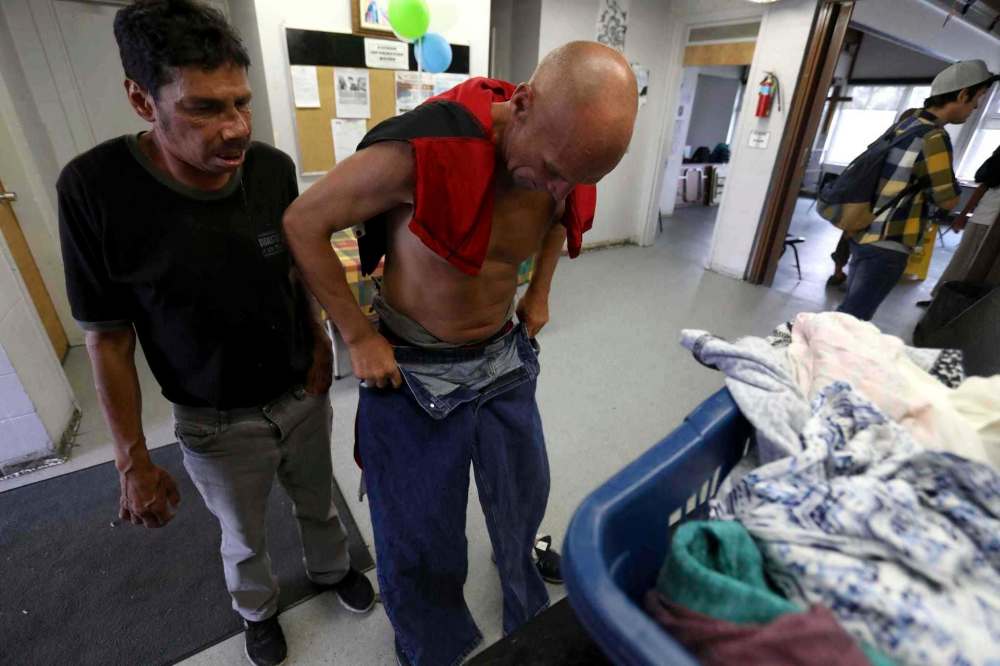
Murphy, 51, walks into the Anamiewigummig Fellowship Centre, a drop-in centre that provides clothing, food, coffee and a shower for free to homeless people in Kenora. He takes off his wet shoes and leaves them to dry overnight. He leans against a counter and rummages through a bin of clean clothes, available for free to the patrons. He picks out a paisley bandanna, a pair of blue jeans that are several sizes too big and a white shirt with flowers across the chest. He doesn’t seem to realize or care that it’s a woman’s shirt.
“I’ve got a beautiful flower T-shirt,” he says, proudly.
He puts on a pair of thick wool socks. “These are some great socks,” he says, his voice lowering in appreciation. “I like this stuff. It’s nice stuff they provide. You can get coffee. You can get relief from the weather. Two showers that are clean.”
Murphy was on Michigan State’s 1986 NCAA championship team and played for the Red Wings for parts of three seasons. He then played for Edmonton, Chicago, St. Louis, San Jose, Boston and finally Washington during his lengthy NHL career. But here, he’s just “Joe.” Everybody seems to know him.
“I reboot here sometimes,” he says. “Get myself energized.”
In late June, Murphy slept on the floor at this shelter for an entire day. “I let him sleep,” Bernice Albany, the shelter director, says. “He was out cold.”
Albany says she sees similar behaviour in crystal meth users who experience a dramatic crash and require long periods of sleep after binging. “One of our patrons here said, ‘Bernice come here. Look at Joe’s arm.’ “
It was infected in the crook of his arm. They suspected it was the result of a bad needle.
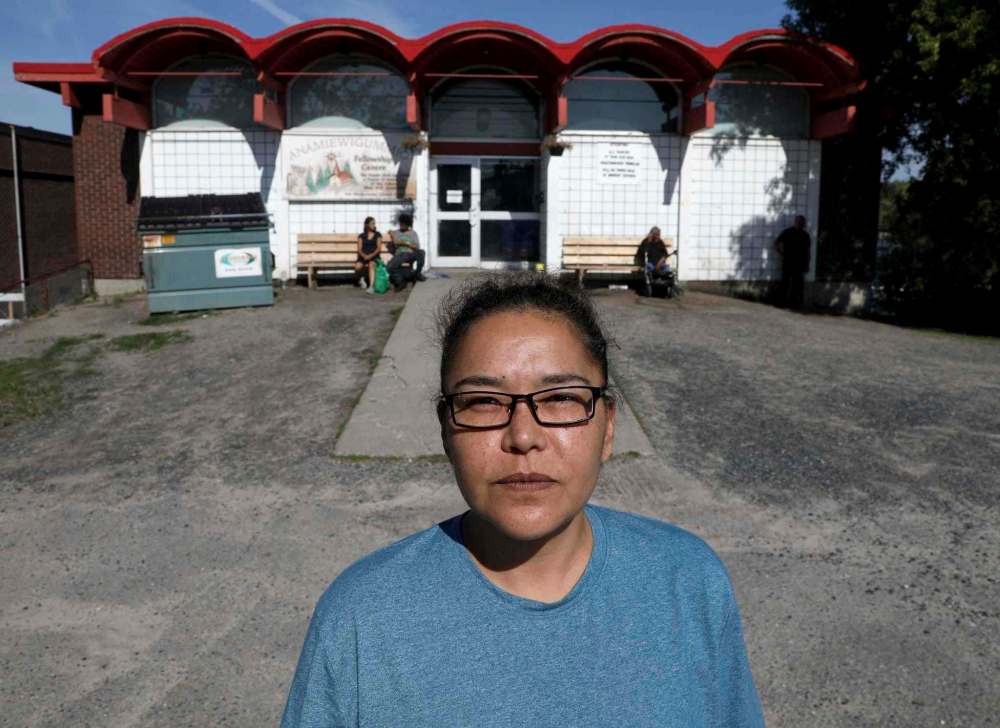
“I suspect he’s using needles,” Albany says. “It looked like he may have an abscess. One of our patrons said, ‘I’m going to get ahold of the health unit.’ They have a program where they drive around and distribute needles and whatnot, just to make sure these guys are getting clean stuff. Now, they have a doctor on board who will check out these things. The patron said, ‘I’m going to phone them right now and have them look at Joe.’ “
Researchers have found an association between substance abuse and repetitive head trauma. While CTE can only be definitively diagnosed when someone dies, many who have suffered repetitive head trauma experience symptoms ranging from headaches to problems with attention, concentration, memory, and impulse control. Such symptoms may also be associated with impulse behaviour and substance abuse, according to Dr. Martha Shenton, a professor of psychiatry and radiology at Harvard Medical School.
“The last time we were here, nobody was saying that he was using drugs,” I say, to Albany.
“You can see it now, right?” Albany says. “There is a big meth crisis going on. It’s just hit us really hard. Our younger generation has been hit by it so bad. It’s a constant battle.”
Every morning, Albany and her staff look for used needles in the grass outside the center.
“We have to check our bathrooms all the time,” she says. “The garbage. It’s a constant, daily thing. This has been going on now for a good half-year now, where they come into the centre. That’s become a crisis with our young people. Many have passed away from crystal meth use. They just don’t care. If you walk around the streets of Kenora, you will notice there are needles everywhere. It’s a big problem. Here, we check every morning.”
Kenora has an estimated homeless population of 200. Albany says about half of them are hooked on crystal meth. “They aren’t normal anymore, they are a different person,” she says. “It’s just a constant battle. It’s so frustrating.”
“Mental health and substance abuse in this community are a huge issue. We deal with it every day. It’s a huge part of our business every day.”– Jeffrey Duggan, the Ontario Provincial Police detachment commander in Kenora
The use of crystal meth has created an enormous burden on the local police force, officials say. The police force is projected to surpass 10,000 total service calls this year after handling just 7,600 in 2014.
“Mental health and substance abuse in this community are a huge issue,” says Jeffrey Duggan, the Ontario Provincial Police detachment commander in Kenora —in essence, the chief of police. “We deal with it every day. It’s a huge part of our business every day.”
The officers try to combat it by getting to know the homeless people, developing relationships, not just with Murphy, but all homeless people for a pragmatic reason.
“The perception is we are helping Joe because he’s ex-NHL, or he had money, or he’s white and not First Nation,” Duggan says. “That’s not the case. We try to help everybody. Because the more people we can help, the less calls for service we have.”
Murphy loves Kenora, this blue-collar tourist town located on the northern shoreline of Lake of the Woods —a massive body of water nestled between Ontario, Manitoba and Minnesota.
But it’s hard to imagine a worse place for Murphy to be homeless. While Kenora is a beautiful destination to visit in the summer, it has a large homeless population for its size, a growing crystal meth problem and the temperatures are frigid in the winter.
•••
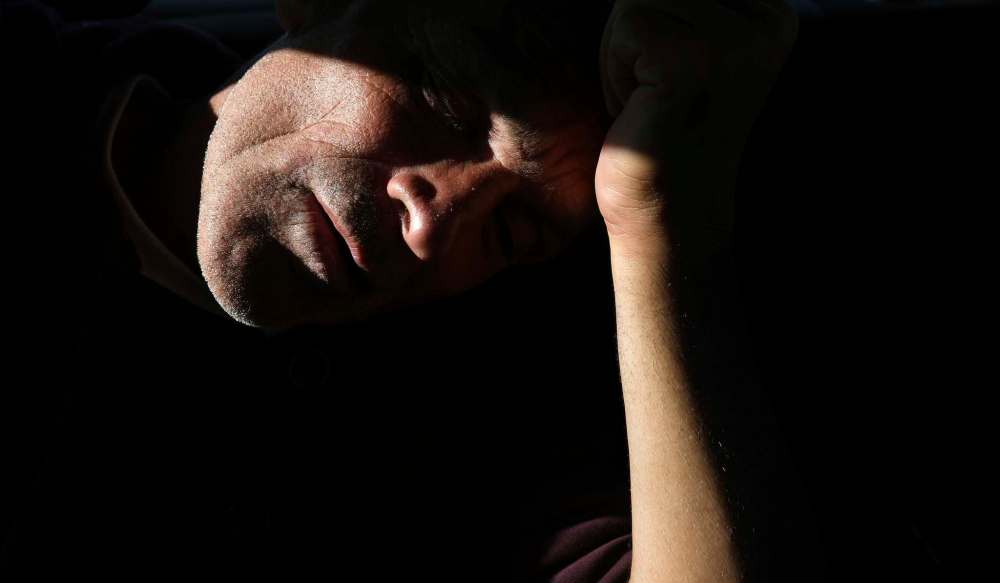
Murphy rests on a wood bench in the middle of Kenora, in front of a burrito restaurant, across the street from a Pizza Hut. The weather is comfortable — low 20Cs, no clouds and the sky is a pastel blue with a pale-yellow sunset.
The bench is short, not long enough for Murphy to stretch out, so he curls into a fetal position and buries both hands between his thighs to stay warm.
His head is shaved except for a patch of hair on the back of his skull. He mumbles to himself for about 15 minutes and then opens his eyes.
Suddenly, he gets a burst of energy. He walks a few feet and sits down at an outdoor piano, outside the burrito restaurant. He starts playing the piano, crouching over and focusing intently, hitting keys and making noise but not really playing a song. “I have played many concertos,” he says in a British accent, sitting at the keyboard. “Amadeus. Mozart in Germany. Beethoven to Bach in France.”
He nods his head.
“To all of the world,” he says, smiling and waving his hand.
“Did all of the lovely ladies love it?” I ask, playing along. When you catch him in the right mood, he is fun, interesting and entertaining.
He nods and smiles. “Ah, we danced away the night,” he says.
It doesn’t make sense that Joe is homeless, not when so many people have tried to help him for several years. Murphy says he receives a $1,000 monthly pension but he burns through it in a matter of days. In his explanation, he makes a reference to drug use. “I’m out of it now,” he says of his pension on the ninth day of the month. “I go through it pretty quick at the start of the month if I’m partying or doing something and medications are coming in and (he laughs) it’s gone.”
Trying to pinpoint what he has done over the last year is difficult.
“How long have you been back in Kenora?” I ask him.
“Jeez, I’m not sure, I’d have to say three or four months,” he says. “I don’t remember where I had Christmas.”
Dates mean nothing to Joe.
“What happened with the apartment?” I ask.
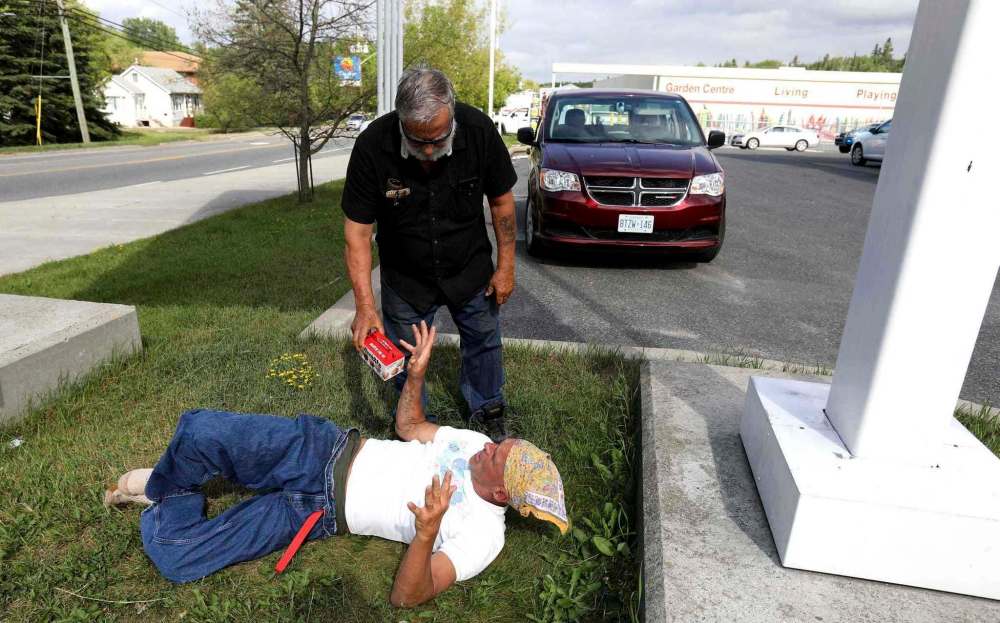
Glenn Healy, the executive director of the NHL Alumni Association, and Adam Graves, who played with Murphy for parts of two seasons in Detroit, went to Kenora in mid-September and found him a place to live for the winter.
“I didn’t ask them to help,” Murphy says. “They put me in a room and I said this room won’t work. It’s going to end in failure.”
He stayed in the apartment for several months. “It was a setup to make me look bad,” he says. “It’s almost a setup. Somebody is trying to control the town and control some things. You gotta get rid of that thing. They are trying to control everybody in it, so they put me in here, and have some fun.”
Murphy wants no pity. Wants no help. He prefers to be alone.
“I get into those situations and my head starts going and I don’t want any trouble to start,” Murphy says. “It’s not the shelters, it’s me. I like having the privacy. It’s my own fault.”
You can find homeless people throughout Kenora, walking the streets, or hanging out in doorways. Many move in packs but not Joe. He prefers to stay by himself.
“Some of our older people, that’s all they know, they prefer to be homeless,” Albany, the director of the shelter, says. “They are so used to it, it’s ingrained in them.”
And the entire homeless system — from the shelter workers to the patrons — becomes a sort of family.
Murphy has no contact with his own family. “I don’t talk to my family and I don’t want to hear from them,” he says. “I wish them the best.”
Albany said Joe is “quirky” but has always been “respectful.” “He’s never given us problems,” she says. “Our patrons all know him. I think he’s happy here…. Everybody just knows him as Joe. They don’t bother him about being, ‘Oh, you used to be this, you used to be that.’ That’s the past. The Joe we know now is how we know Joe.”
Quirky doesn’t begin to describe it. He breaks into an English accent, describing his penthouse and sipping champagne. “I’m doing well,” he says. “I’m moving into my new place. It’s awesome. We are having dinner there on the waterfront…. Let the Detroit people know I’m doing good and not to worry about anything. And congratulations to Steve Yzerman. Can you believe the Red Wings will be flying again?”
He continues talking, like he’s the narrator for a show about the rich and famous, describing his “gorgeous” apartment downtown.
“More investments are coming,” he says, full of life and energy, “and we are building. We are the Kenorians!”
•••
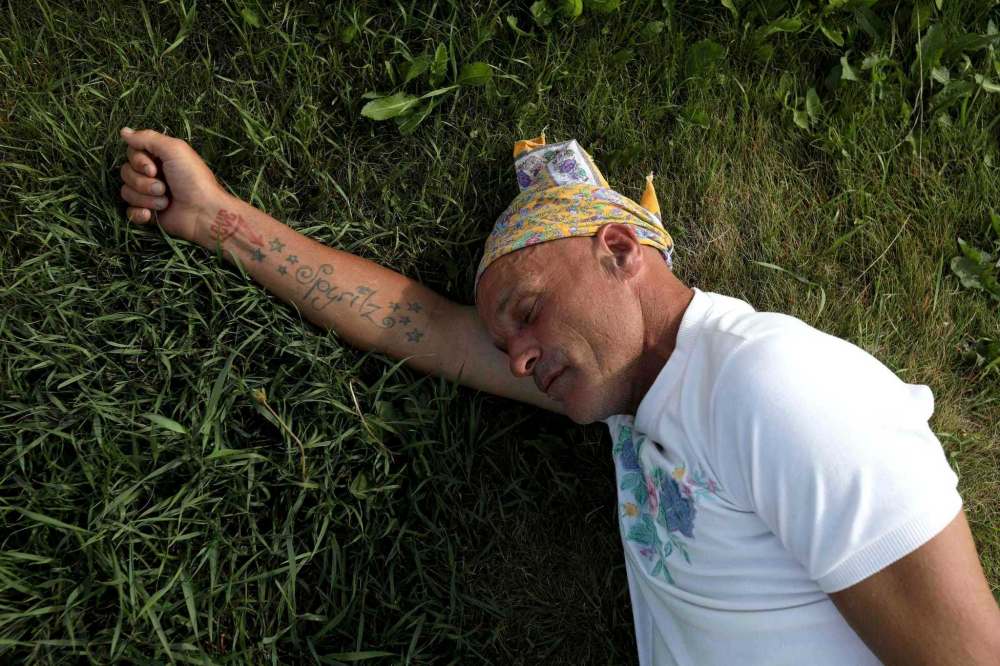
Murphy denies using drugs. Then, he admits it. Then, he denies it vehemently until he subtly admits it while describing a scene that happened last winter when a police officer spotted him acting strangely.
“I think I was a little bit over-medicated,” Murphy says. “And they could tell. I was outside and it was colder.”
The tone of his voice changes and he imitates the police officer talking: “Hey man, come on down here and get in.”
His voice returns to normal. “I was a little bit over-medicated,” Murphy says. “I’m taking my medication. I don’t have a prescription from a doctor. I have a lot of aches and pains. We can get the same thing on the street.”
Murphy was taken to a local hospital before being transferred to a bigger facility in Thunder Bay. “I was floating in and out of the room,” Murphy says. “In so much of a funny state. I lost something and there was confusion.”
As Murphy remembers it, he simply got in a cop car and ended up at the hospital. But it was far more involved and elaborate than that. He was picked up by the police as part of a court-ordered evaluation under the Mental Health Act of Ontario, signed by the Justice of the Peace, a judicial officer with limited policing authority.
“There was a lot of work put into it, that’s what the system calls for,” Duggan says. “It’s called a Form 2 process. Form 1 is when we determine they can’t take care of themselves and they are a danger to others. Joe doesn’t exhibit those symptoms. Form 2 is when your family (or a friend) has a concern about your well-being from a mental health state. They go through that process. They take that form to the Justice of the Peace. They get it signed. They give it to us. And then we execute it.”
The police had the authority to take Murphy by force but he went willingly. “Our officer has that relationship with him,” Duggan says. “He trusts our officers. The thing about Joe is, if you give him food, he’ll go anywhere with you.”
Murphy estimates he stayed in Thunder Bay for a month before returning to Kenora. “I ended up needing to get back in the hospital, to get a reprieve and to get a break,” he says. “Just to get a rest and get checkups.”
•••
The tourists disappear, as darkness settles over Kenora, and the streets go quiet.
Murphy looks at a man walking down the sidewalk on the other side of the street.
“I need to talk to this guy,” Murphy says. “I’ll be right back. Stay here.”
Murphy hustles across the street, wearing only a pair of wool socks. He left his shoes at the shelter to dry for the night. He uses a red dog leash as a belt but it doesn’t hold up his pants. He has to clutch his jeans at the side to hold them up as he approaches the man.
They walk down the sidewalk, side by side, and Murphy hands the man some money.
After a short time, Murphy comes bouncing down the sidewalk back toward us, looking giddy.
The next day, I ask him point blank: “Did you buy drugs from that guy?”
Murphy breaks into a smile.
“He felt you were a KGB or FBI investigator,” Murphy says.
“Were you buying drugs?” I ask again.
“Well, they thought you were drug paraphernalia sellers as well,” Murphy says, breaking into a foreign accent. “He was worried if you guys were selling drugs to me. The exact same question. In pure form.”
Murphy is intelligent and has a strong memory on some subjects — he can talk eloquently about the recent NBA playoffs or about NHL history — but he has wild mood swings. At times, he can be respectful and thoughtful. At other times, he can fall into an unresponsive, almost catatonic state, mumbling incoherently. But right now, he’s in a playful mood and it is difficult to tell whether he is joking, or telling the truth, or telling what he believes to be the truth.
“You bought something from him,” I say. “There was an exchange.”
“I gave him money,” Joe says. “There was a loan. It was unpaid and I owed it to him.”
I ask Joe how many people in town are doing crystal meth.
“In what form?” he asks.
“Needles.”
“Our needle epidemic of older people, in their homes, at massive proportions,” Murphy says, in a grand British accent.
After I tell him that the police have told me that they suspect he is using drugs, and others have told me about his use of needles, his mood changes dramatically. “That’s not true,” he says in a grand, overwrought British accent. “They have no account. They are speaking out of turn. I’d like you to axe that out. They are having their own difficulties of drinking and their own stupid-ience.”
Murphy is on a roll now, growing so excited that he is making up words.
“And they will judge me and tell me their lies against me!” he says. “Who are they to say?”
“Do you do any drugs?” I ask.
“Do you?” he asks.
“I drink alcohol,” I say. “Do you do any drugs?”
“Of course,” he says, in full accent. “An abundance of drugs. Drugs of every kind.”
A moment later, he denies it again.
•••
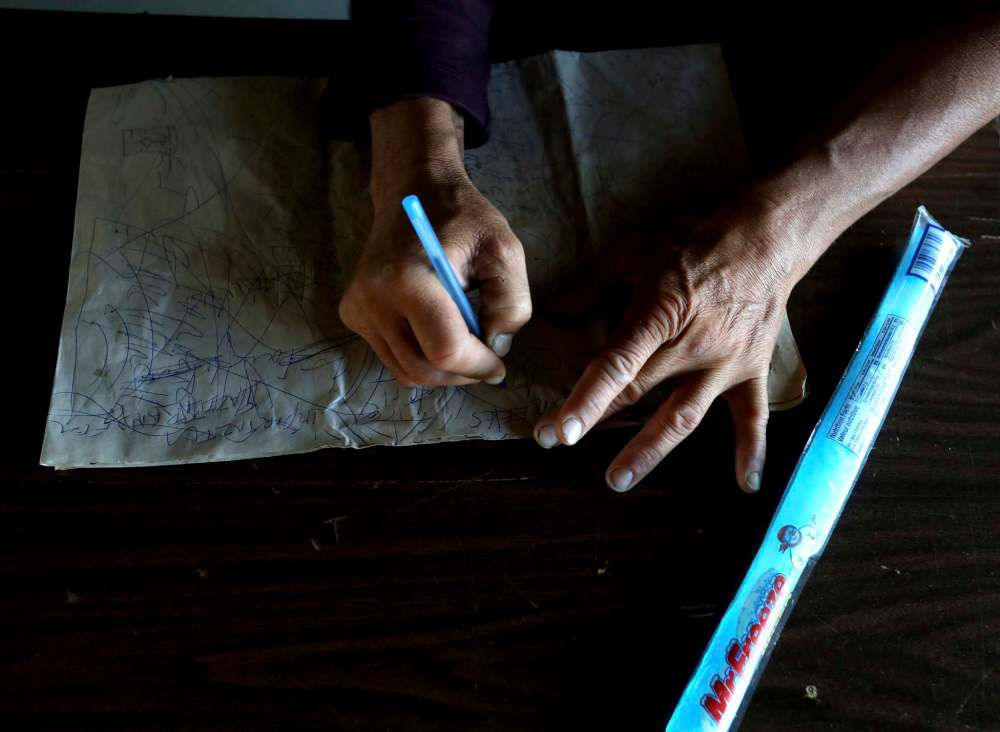
Murphy carries around sheets of white paper, which he folds into a small booklet. While scribbling in it — doodling pictures in blue ink and writing down seemingly random words and phrases — he asks my full name.
“I won’t steal it,” he says.
He breaks into a huge smile, nodding his head, writing it into the booklet.
“Jeff, you and me share the J,” he says. “I love my Js. Your Fs are fours and fives.”
He takes on a serious, instructive tone. “Always remember, you’ll be stronger as you go,” he says. “You have to go up the ring ladders. Don’t worry about getting to 10, just get to the 9. And the 1 and 1 will be on both sides.”
While there are times when it’s difficult to follow what he’s saying, he speaks with so much passion and sincerity that it’s endearing.
“He’s so quirky and so — Joe,” Albany says.
Earlier this summer, Murphy walked up to Albany while holding a rock. “He said, ‘You could see the faces of angels in the rock,’ ” Albany says. “And he was holding it really close to himself.”
•••
He blames no one for his situation. “I’ve made some good decisions and also some not-so-good decisions,” he says. “Right now, it’s been going kind of better for me.”
Murphy walks constantly, crisscrossing Kenora from one end to the other all day long, and he is fascinated by nature. He picks up a mayfly. “Now, look at these things,” he says. “It looks like a person.”
He holds the mayfly upright and moves it toward me. “Look, it wants to talk to you,” Murphy says. “It flew in to talk to us. It’s beautiful. They come into town but die right away. I don’t know what’s going on, but they sure are nice.”
Deer routinely walk through town, grazing in front yards, and the bucks still have fuzz on their antlers. “I love the animals,” Murphy says. “There was a skunk who was living at this place where I was living on the other side of town. This thing was incredible. It was this male skunk, I couldn’t believe how beautiful it was. It would follow me. I went down to the — and I said, ‘Hey man, get yourself a lady.’
“Well, I think it made its way over to here. I don’t think it’s alive anymore. I think it had three little babies. I went back, looking for it, but I don’t know where it is.”
What’s next: To stay, or go?
Will he ever come off the streets? Will he ever accept help?
It’s up to Murphy.
The NHL Alumni Association arranged for Murphy to enter a mental health and substance abuse treatment centre several times over the last year. Everything was set. All he had to do was get on a plane. But Murphy refused, saying it was too far away. So the Alumni Association found another centre closer to Kenora. Murphy continues to refuse the help, and the offer still stands.
“Any player can get help at any time,” Healy says, speaking in broad terms, about the 3,800 members of the NHL Alumni Association.
Healy declined to comment on Murphy’s situation, saying he wants other former players to feel comfortable that he will preserve their anonymity if they seek help.
“He’s been struggling– doesn’t know if he should go or stay. Nobody wants him to leave. Everybody is saying, ‘No, Joe, you can’t go.’ ” — Bernice Albany
NHL players might look like supermen, in their uniforms, out on the ice. But when they take off that sweater and retire and put away their sticks, they have issues just like anyone else.
It is estimated that one in five people have mental health issues, Healy says. And hockey players are no different. The Alumni Association is trying to remove the stigma of mental health: It’s OK to ask for help. It’s OK not to be perfect. And help is available.
“It requires one phone call,” Healy says. “And we launch the army of help, if the player is in need and is in distress, asking for help.”
That help is available to Murphy — he could make a single phone call and that army from the Alumni Association would come swooping in.
But Murphy keeps refusing it.
As for the future, Murphy says he is about to move, probably to Winnipeg. For the past week, he has been talking about it constantly.
“He’s been struggling — doesn’t know if he should go or stay,” Albany says. “Nobody wants him to leave. Everybody is saying, ‘No, Joe, you can’t go.’ “
He talks optimistically about the future. “I think next month or two, I’m going to go on a roll and things are going to be good,” he says. “I really feel a lot of good things coming on and I look forward to the upcoming NFL season. I love the TV and the sports. Then, in October, the baseball World Series. And the basketball and hockey opener. It’s quite a time.”
He says he wants for nothing. “Just respect is all,” he says. “I’m not asking anybody for money. I feel bad taking money.”
As I walk away from Murphy, he is down by the harbour front. He holds a disposable razor, which he uses to shave his head without shaving cream. He still has some vanity. It doesn’t bother him when people see him sleeping on a bench, or sleeping in a doorway, or going into a homeless shelter, or walking around town without shoes and wearing a woman’s shirt.
But he doesn’t like pesky grey whiskers or the grey stubble on his head. He doesn’t want to look like, in his words, a bum.
I look back at him, standing in the sunshine, and he is smiling and laughing so hard he bends over.
Not a care in the world.
— Detroit Free Press




